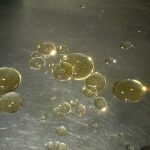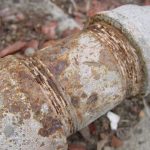If you turn on your tap and your water smells foul, it’s hard to describe the experience to someone that hasn’t experienced it themselves. After all, we rely on a constant supply of clean water to stay fit and healthy, and if the water smells bad, something is seriously wrong. It’s important to take this problem seriously, but different smells can indicate different problems that need to be solved quickly. In this article, we will look at some common bad smells in tap water and explain what they mean.
A Sulfur or “Rotten Egg” Odor
If your tap water smells like rotten eggs, the likely cause is inside your water heater. You may think that the cold water is not affected but remember that both cold and hot water lines run through the water heater. The cause is hard water, it travels through the water heater, and the excessive mineral content is deposited inside the unit. Eventually, a coating of magnesium, calcium, and sometimes iron will buildup and cause that unpleasant odor. The only way to deal with this problem is to contact a local certified plumber and ask them to drain and flush your water heater.
A Bleach or “Swimming Pool” Odor
This type of strong odor is caused by excessive volumes of chlorine in your water supply. This chemical is added to the public water supply to kill any organisms that may be lurking there, and it’s extremely effective. If you can smell chlorine, it’s likely that you live a far distance away from your local water treatment plant. Because the treated water has to travel further to reach your home, extra chlorine is added. Drinking water that contains chlorine is relatively safe, but it can make it unpalatable, and you may want to invest in a water treatment system that can remove it.
A Noxious “Fishy” Smell
This may seem very disturbing, but don’t panic. There are a number of reasons why this may occur, and most of the time, it is not a dangerous phenomenon. There is a naturally occurring mineral called Barium that can cause this odor, and it is not harmful to your health. Adding a tap filter usually fixes this problem quickly, and your local certified plumber can help you to choose and fit one. Another possible cause of this odor may be algae bloom in your public water supply. Inform your water provider and make them aware of this problem. The final cause may be an excess of ammonia that has reacted with the chlorine in your water supply. This may sound alarming, but ammonia has been used to treat public water supplies for decades, and it isn’t regarded as a health threat.
A Smell of Sewage
Although you may be able to smell sewage in your tap water, the actual source of this odor is likely to be in your drain. Even if you have a drain trap and you’re careful organic material will enter the drain over time. This can include material, such as food scraps, hair, soap, nail clippings, and more. There is an easy way to test this, simply pour a glass of water, set it aside, and smell it. If the water doesn’t smell like sewage, the problem lies in your drains. Contact your local certified plumber and ask them about a health check for your drain system.
If you turn on your tap and your water smells foul, it’s hard to describe the experience to someone that hasn’t experienced it themselves. After all, we rely on a constant supply of clean water to stay fit and healthy, and if the water smells bad, something is seriously wrong. It’s important to take this problem seriously, but different smells can indicate different problems that need to be solved quickly. In this article, we will look at some common bad smells in tap water and explain what they mean.
A Sulfur or “Rotten Egg” Odor
If your tap water smells like rotten eggs, the likely cause is inside your water heater. You may think that the cold water is not affected but remember that both cold and hot water lines run through the water heater. The cause is hard water, it travels through the water heater, and the excessive mineral content is deposited inside the unit. Eventually, a coating of magnesium, calcium, and sometimes iron will buildup and cause that unpleasant odor. The only way to deal with this problem is to contact a local certified plumber and ask them to drain and flush your water heater.
A Bleach or “Swimming Pool” Odor
This type of strong odor is caused by excessive volumes of chlorine in your water supply. This chemical is added to the public water supply to kill any organisms that may be lurking there, and it’s extremely effective. If you can smell chlorine, it’s likely that you live a far distance away from your local water treatment plant. Because the treated water has to travel further to reach your home, extra chlorine is added. Drinking water that contains chlorine is relatively safe, but it can make it unpalatable, and you may want to invest in a water treatment system that can remove it.
A Noxious “Fishy” Smell
This may seem very disturbing, but don’t panic. There are a number of reasons why this may occur, and most of the time, it is not a dangerous phenomenon. There is a naturally occurring mineral called Barium that can cause this odor, and it is not harmful to your health. Adding a tap filter usually fixes this problem quickly, and your local certified plumber can help you to choose and fit one. Another possible cause of this odor may be algae bloom in your public water supply. Inform your water provider and make them aware of this problem. The final cause may be an excess of ammonia that has reacted with the chlorine in your water supply. This may sound alarming, but ammonia has been used to treat public water supplies for decades, and it isn’t regarded as a health threat.
A Smell of Sewage
Although you may be able to smell sewage in your tap water, the actual source of this odor is likely to be in your drain. Even if you have a drain trap and you’re careful organic material will enter the drain over time. This can include material, such as food scraps, hair, soap, nail clippings, and more. There is an easy way to test this, simply pour a glass of water, set it aside, and smell it. If the water doesn’t smell like sewage, the problem lies in your drains. Contact your local certified plumber and ask them about a health check for your drain system.
By Giovanni Longo President Flood Brothers Plumbing
Giovanni Longo is a 3rd generation master plumber who has been practicing his craft and trade in the greater Los Angeles area for well over a decade and a half. A plumbing and hydraulics-engineering innovator, Giovanni’s particular world-class expertise focuses on dealing with challenging sewer system designs as well as resolving complex commercial and residential draining issues. As a certified Flood Mitigation expert, he is also well versed in a wide variety of water damage and remediation solution.





